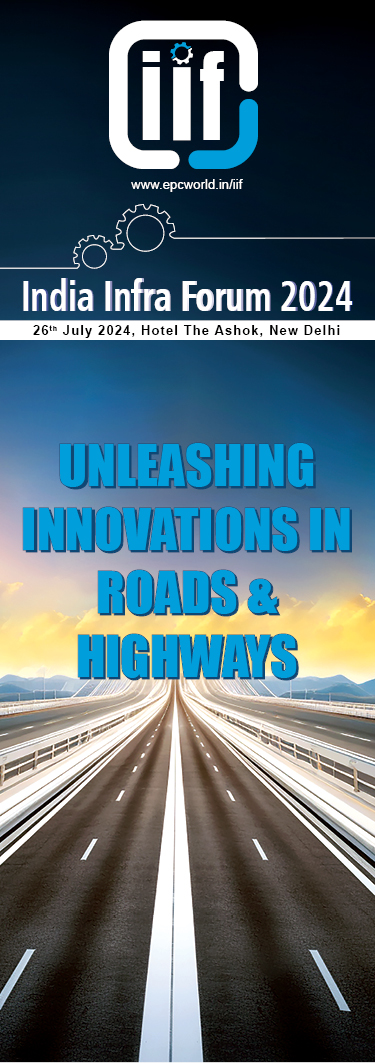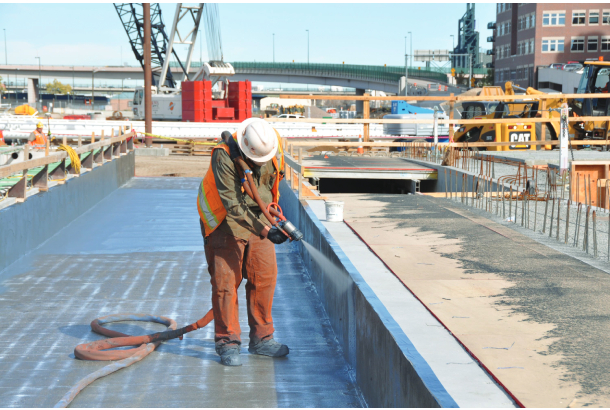Often relegated to the back, the construction chemicals industry is emerging as the key player in construction and infrastructure sector. Government’s quality control and watchful eye for superior infra projects – be it roads and highways or realty is adding strength to construction chemicals industry to surge ahead
Cement plays the role of binding agent in concrete. Concrete is made of sand, crushed rock and gravel which is bonded together by cement and water. Concrete goes into construction of real estate, dams, bridges and many infrastructure projects. In fact, as per reports, concrete is the second most consumed material in the world after water. But long ago when concrete based on cement was initially used in construction, the building structures after a period of time started to crack. Prior to concrete based on cement it was lime concrete and lime mortar that were used for construction. To remedy the drawbacks in concrete based on cement, construction chemicals were invented. Over the time construction chemicals become an integral part of concrete. Today, the construction chemicals market has grow exponentially. As per Persistence Market Research analysis, the India construction chemicals market is projected to reach a market value of US$ 21.6 billion in 2031, expanding at an impressive CAGR of close to 14% over the forecast period of 2021-2031.Over the time with improvement in construction technology and construction materials, many types of construction chemicals were invented to suit the requirement. Few of the construction chemicals that are extensively used are concrete hardeners, protective and decorative coating, concrete curing, epoxy coating, mould releasing agents, polymer bonding agent, ready mix plaster, polymer modified mortar and waterproofing chemicals.
Concrete hardeners are a permanent, transparent sealer that protects underlying concrete from damage caused by chemicals and contaminants. Hardeners act as a strong adhesive for different floor coverings and surface treatments. They prevent newly poured concrete from curling, a distortion of a slab into a curved shape by upward or downward bending of the edges. Hardeners can be applied to new or existing slabs. Floor hardeners can be liquid or solid, metallic or non metallic. Metallic floor hardeners (solid) are well graded ferrous aggregates. Liquid floor hardeners are water, silicate etc. based solutions. Pigmented floor hardeners also improve the appearance of floor surfaces. Protective and decorative coating is a layer of material applied to the surface of another material with the intent of inhibiting or preventing corrosion. Commonly used materials in non-metallic protective coatings include polymers, epoxies and polyurethanes. Materials used for metallic protective coatings include zinc, aluminum and chromium. Special materials are used in the finishing coats of plastering or over the plastered surfaces to meet one or more of specific requirements such as decorative appearance, high durability, fire – proofing, heat insulation, sound insulation, early completion, high strength, etc.
Concrete curing compound consists essentially of waxes, natural and synthetic resins, and solvents of high volatility at atmospheric temperatures. The compound forms a moisture retentive film shortly after being applied on a fresh concrete surface. White or gray pigments are often incorporated to provide heat reflectance, and to make the compound visible on the structure for inspection purposes. Epoxy coating can be single or two-component. Single-component epoxy paints are usually oil based. Two-component epoxy coatings are mixed in situ in proportions as prescribed by their manufacturers and they are quite suitable for factory, industrial or commercial building applications by dint of their excellent chemical & thermal resistant characteristics, hardness, durability, waterproofing characteristics, etc. They are solvent-free. Epoxy coatings are also used in flooring for decorative purposes.
Polymer bonding agent is an aqueous emulsion of a polymer and chemical admixtures. It is designed for use as a bonding agent with concrete and cement-based products in interior or exterior applications. The use of Polymer Bonding Agent in concrete and shotcrete also gives significant improvements in resistance to penetration by chlorides and de-icing salts. Ready mix plaster is a factory mixed/premixed sand-cement based plaster. They are generally used for building houses or making solid structures. Polymer-modified mortar is made by replacing a portion of the traditional binders with polymers. Polymers are added to mortar to increase characteristics that may include adhesion, toughness, flexural or tensile strength, and resistance to chemicals. Polymers act to improve the workability and adhesion of non-hardened mortar and often require less added water than does traditional mortar, which results in fewer pores and stronger cements, subsequently reducing water ingress and permeability to salts. Waterproofing chemicals can be quite useful when a structure’s waterproofing capability is to be given a boost which is especially required for structures constantly dealing with liquids. There are many varieties. Some of them are crystalline waterproofing chemicals, liquid acrylic elastomeric waterproofing compounds, polymer modified waterproofing compounds, cementitious waterproofing compounds etc. Many of these compounds form membranes on the concrete surfaces to protect them from ingress of water.
The Caulks and sealants are basically a barrier to external factors like dust particles, liquids, moisture, oxygen, etc. They are known to seal an opening or a surface in order to avoid leakage of any gas or liquid. Usually, they are used to fill small gaps that are tough to cover, with materials such as drywall, concrete, etc.
The water repellents are extensively used to protect masonry and concrete from the adverse effects of water or moisture. Acrylic protective coating, silane siloxane water repellent sealer for tiles, and stone masonry are some of the main types of water repellents. Adhesives are widely used in almost all types of projects from industrial to commercial or residential construction projects. They possess qualities such as weatherproofing and waterproofing and are rich in bonding properties. There are many types of adhesives such as silicone adhesives, PU based adhesives, UV adhesives, acrylic adhesives, and many more. Adhesives are used in a great variety of construction works which include panel fixing, tile fixing, and floor covering. According to Persistence Market Research analysis, market share of waterproofing chemicals and plaster is high in the Indian market as compared to the developed world, while the share of concrete repair mortar, protective coatings, and asphalt additives is low.
Hiccups and road blocks
Construction chemicals market in India is highly fragmented. The industry does not have a standard code for the use of construction chemicals in various applications. According to industry analysts the construction chemicals market is highly developed in developed countries. Research in construction chemicals is a continuous process over there. Some of the codes that have been established in developed countries are being adopted in India too. However, analysts point out, it is high time India should develop its own standards and codes taking into consideration the prevailing environmental conditions, materials and methods of constructions. This unregulated nature of the industry has given rise to counterfeit, spurious and inferior construction chemicals and admixture, which is flooding the market. To counter counterfeit and spurious construction chemicals and to safeguard their brands the construction chemicals majors are placing quadruple seals, holograms on every container - small or big coming out from their production line. As per a recent study, close to 85 percent of the construction industry professionals are not aware of the right usage on construction chemicals. Application of construction chemicals in itself is a highly skilled job. But the industry rues that hardly there are skilled professional available to do the job. Sunanda Speciality Coating to overcome shortage of skilled manpower trains the practitioners in concrete technology on the basis of model worked out by the American Concrete Institute (ACI). While MC-Bauchemie (India) through its MC-Forum is bringing together industry professionals to provide and discuss information on general developments and trends in the construction chemicals market. To make sure that all stakeholders/ users/applicators can get access to the information which is necessary to accomplish their project satisfying, MC-Bauchemie (India) runs various national and international training courses and events in which they disseminate information regarding new trends in construction, besides explaining what should be done to make sure that a theoretical solution turns into practical success. The industry in India is in nascent stage and so are the awareness levels. In India as per a report there has been no proper study co-relating durability of construction chemicals on Indian structures. Lack of proper studies and improper use of construction chemicals by users have created lack of understanding about construction chemicals. India being a price sensitive nation, the margins offered by leading players are low because of this the building contractors prefer low-cost chemicals to reduce the overall construction cost. In countries such as India, high value products have limited demand and are used only by premium construction houses. There is total disregard to quality standards by the unorganized players. The bulks of the products are imported illegally which hurt the profits of domestic players.
Expanding market share
Recently, JSW Cement has entered the construction chemical business and has set up a 0.3-million-ton manufacturing facility in Ballari in Karnataka to produce its construction chemical product range. The product range comprises 'Enduro Plast' readymix plaster, 'Krysta Leakproof' integral crystalline waterproofing compound and 'Duraflor'floor hardner. Pidilite Industries has partnered with GCP Applied Technologies Inc, a global leader in construction products, to offer high-performance waterproofing solutions for challenging sites that have exposure to high temperature variation and water table, under its brand Dr.Fixit®. As a part of the partnership, Pidilite’s Dr.Fixit® will offer GCP’s PREPRUFE® - differentiated, fully adhered waterproofing membranes and SILCOR® 1100 – fast and secure liquid waterproofing membranes in the Indian market. PREPRUFE® is a high performing, pre-applied waterproofing system for critical below grade applications. It is easy to install and provides a strong protection against migration of water, moisture and gas. It is also UV resistant and delivers great results even in harsh conditions or environment. While SILCOR® 1100 is a structural waterproofing membrane designed for buried application and the protection of concrete structures. SILCOR® 1100 is formulated by using the unique ESSELAC® advanced resin technology. It is economical, fast, easy to apply, seamless, durable, and its unlimited overcoat time reduces wastage and ensures longevity of the structure.
Sika India has opened a new technology center and manufacturing plant for high-quality adhesives and sealants in Pune, while its parent company has signed a definitive agreement to acquire MBCC Group, the former BASF Construction Chemicals, from an affiliate of Lone Star Funds, a global private equity firm, for a consideration of EUR 5.2 billion. Tremco CPG India, a leading player in construction chemicals, has inaugurated a second manufacturing plant in Alwar, Rajasthan. This 50,000 sq ft plant will manufacture highly differentiated products from their product portfolio including admixtures, powder products, waterproofing and resin flooring systems.
Opportunities galore
Covid-19 pandemic has derailed the economy worldwide. India’s economy is slowly coming back on track and the decision makers are aware infrastructure development holds the key for fast acceleration of India’s economy. India has plenty of infrastructure projects to drive the growth of construction chemicals business in India. To start with, there are enough of businesses for construction chemicals players in government projects such as 'Housing for All’ and Affordable Housing, Smart Cities project, Prime Minister's AwasYojana for both rural and urban. Then there are the renovations and redevelopment of older building which is emerging as a major market for construction chemicals industry. On the infrastructure front, the demand is there from the asphalt and concrete roads and highways players, repairing of old roads, underground tunneling, bridges, dams, the Bharatmala and Sagarmala projects.
Without construction chemicals it is next to impossible to have strong, crack-free concrete structures and herein lies the key to leverage the growing construction chemicals market.






